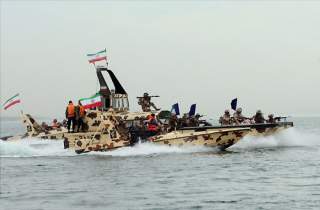How Saudi Arabia and Israel Are Bracing for the Iran Deal's Collapse
They’re watching carefully for any slip-ups.
In fact, Saudi Arabia has already laid down the foundation for its own nuclear infrastructure. Admittedly, the nuclear energy program could provide the infrastructure for a clandestine weapons program, especially if Riyadh decides to enrich its own uranium. But observers have argued that purchasing enrichment technology or, better still, nuclear weapons from Pakistan is a more plausible scenario. Saudi Arabia has a long history of collaboration with Pakistan and, by all accounts, financed Abdul Qadeer Khan, the “father” of its nuclear weapons. In 2013, Mark Urban, the BBC defense correspondent, claimed that, as part of the finance deal, the Pakistanis fabricated a number of warheads to be transferred to Riyadh in an emergency. Other journalists have supported the “off-the-shelf” Pakistani arsenal theory as well. However, it is hard to assess the veracity of these reports. The Saudis have a vested interest in demonstrating that the nuclear deal with Iran would spur proliferation. Having objected to the impending JCPOA, Saudis found it useful to disclose information strengthening the proliferation scenario.
Translated into the language of realist theory of international relations, Saudi Arabia accepted the diminished role of the United States in the Middle East and its perceived shift toward Iran. Indeed, this is the gist of the evolving “Salman doctrine,” which also envisages isolating Iran diplomatically and using conventional military means to increase Tehran’s cost of fomenting upheaval. At the present time there is nothing in the “Salman doctrine” to hint of proliferation but, depending on future developments, the nuclear option could be incorporated.
To dissuade Riyadh from taking the nuclear path, the Obama administration agreed to upgrade the Patriot antimissile defense system operating in the kingdom, but President Obama has not signaled his decision yet and, in any case, the outcome of the 2016 election may further disrupt traditional American foreign policy in the region. However, for the time being, the monarchy seems to have taken a low-key approach and, under pressure from the United States, reluctantly accepted the JCPOA, but has worked on creating a hedging strategy should Iran abrogate the agreement.
Iran defaulting on the JCPOA, either as breakout or a sneak-out, could radically reconfigure the equation. Germany’s intelligence agency recently produced a report detailing Iranian cheating strengthens such a plausible scenario. By doing so, Saudi Arabia may try and leverage its fledgling nuclear-energy project into military one. Israel may also try again to execute a preemptive strike or, at the very least, a massive clandestine operation.
Farhad Rezaei is research fellow at Middle East Institute, Sakarya University, Turkey. He is the author of the forthcoming Iran’s Nuclear Program 1979-2015: A Study in Nuclear Proliferation and Rollback (New York: Palgrave Macmillan, 2016).
Image: IRGC amphibious forces in a naval exercise, 2015. Wikimedia Commons/Shahab-o-din Vajedi.

